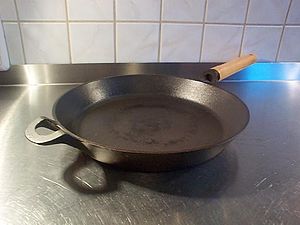 Image via WikipediaAnd indeed, these things may be true. However, when it comes to nonstick, there's more to consider than meets the eye. Many studies have shown that harmful particles may not only be released into the air from the lining during high-heat cooking, but of course also find their way into your food.
Image via WikipediaAnd indeed, these things may be true. However, when it comes to nonstick, there's more to consider than meets the eye. Many studies have shown that harmful particles may not only be released into the air from the lining during high-heat cooking, but of course also find their way into your food.Here are a few considerations to think about before purchasing or using a non-stick pot or pan:
Longevity: Most non-stick cookware, though it may have a seemingly good price when you purchase it, will not last more than 5-7 years TOPS (and that's for the really good quality stuff, and assuming it is properly cared for). After that (or before), it loses its non-stick properties, often becoming even "stickier" than regular pots & pans! Most households actually end up buying new non-stick pans every 3-4 years. When you add it up, well...it adds up.
Durability: This ties into the previous issue, but also has potential health concerns. With use (particularly if used over too-high heat, or with metal utensils (a BIG no-no), the lining of the non-stick pan can begin to release particles into your food. Over time, these particles become flakes, and even (in some lower quality cookware), entire large pieces of the lining can peel off during use! While the jury is still out on just exactly how harmful this material is, I am not a big fan of eating parts of my cookware either way - and you shouldn't be either.
Waste: What happens to all those non-stick pans that get replaced every few years? Are they responsibly recycled? Most probably are not, since the whole pan would need to be refinished on the inside. Do they end up in landfills? Most likely. Not only is this a waste of all that metal, but think of what happens to the rest of the coating as it disintegrates and slowly makes its way into our waterways.... Yep - it goes right back into your body - and you thought you got rid of that pan years ago!
 Image via WikipediaSo what is the solution? There are LOTS of great cookware options out there. Each has its pros & cons (we'll cover some of these here from time to time - and listed a few examples below; there is also some more cookware info on our website at http://www.newholisticliving.com/cookingfromscratch.html), but in general stainless steel, cast iron, and glass can all be good choices. (If you are going the cast iron route, either get a "pre-seasoned
Image via WikipediaSo what is the solution? There are LOTS of great cookware options out there. Each has its pros & cons (we'll cover some of these here from time to time - and listed a few examples below; there is also some more cookware info on our website at http://www.newholisticliving.com/cookingfromscratch.html), but in general stainless steel, cast iron, and glass can all be good choices. (If you are going the cast iron route, either get a "pre-seasonedReally good cookware may be more expensive up front than some of the cheaper non-stick types (except for cast iron), but they can last you many many more years (even generations), so in the long run, you'll end up spending a lot less anyway. If you can't afford a whole set of great cookware at once, pick up a piece at a time, when you can afford it, and soon you'll have a great set that may last you the rest of your life.
So what if you already have non-stick cookware at home? We don't recommend just throwing it out if it's in good condition (though eventually you may need to find a recycler that will take it), but there are some steps you can take to maximize your health while using it.
1. Don't use the pan over high heat. Non-stick cookware is best used over medium heat or lower. If you need to sear or fry something over high heat, use stainless steel or cast iron instead.
2. NEVER USE METAL UTENSILS IN A NONSTICK PAN! Plastic, silicone, or wooden utensils ONLY are okay for use with a nonstick surface.
3. Wash as soon after use as possible by hand, with hot water and gentle soap and a sponge only - do not use harsh abrasive cleaners or scrubbers (a plastic scrubber may be used if necessary, but you shouldn't need it in a non-stick pan), and be sure pan is completely dry before storing. (Do NOT wash in a dishwasher!)
4. From time to time (about every 3-4 uses) wipe inside lightly with paper towel dabbed with cooking oil before storing.
5. If you notice the pan is losing its nonstick properties, or if you see any peeling or flaking of the lining, replace the pan immediately with something more durable and healthy for you and your family.

No comments:
Post a Comment
We welcome comments and suggestions!